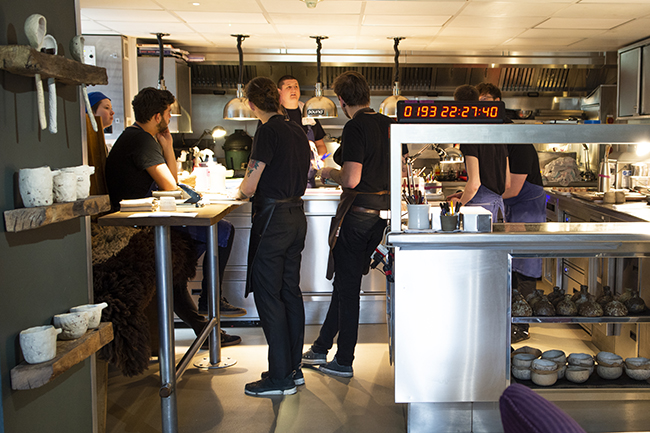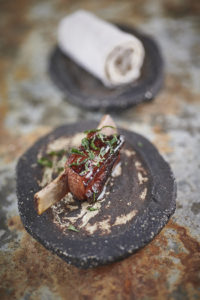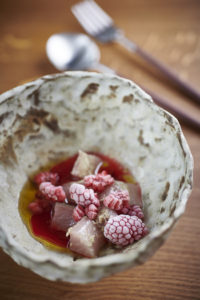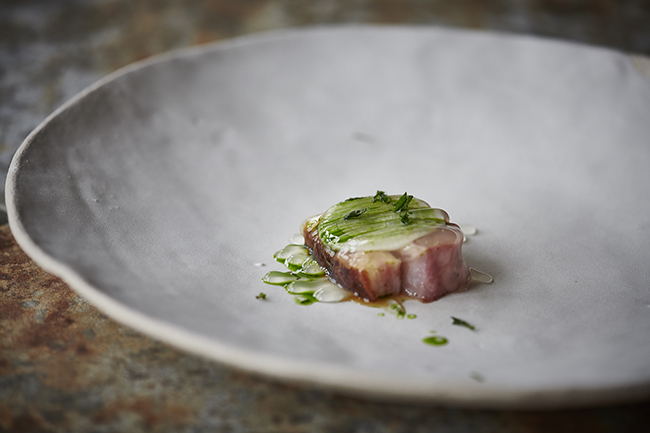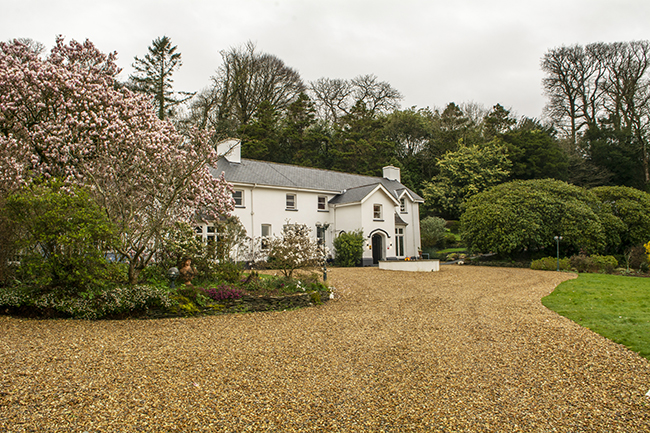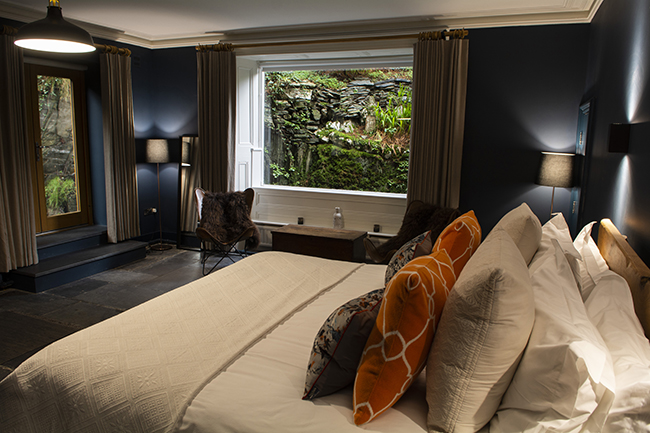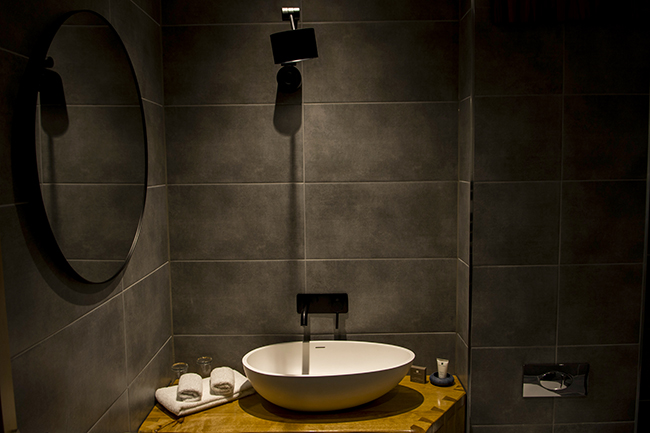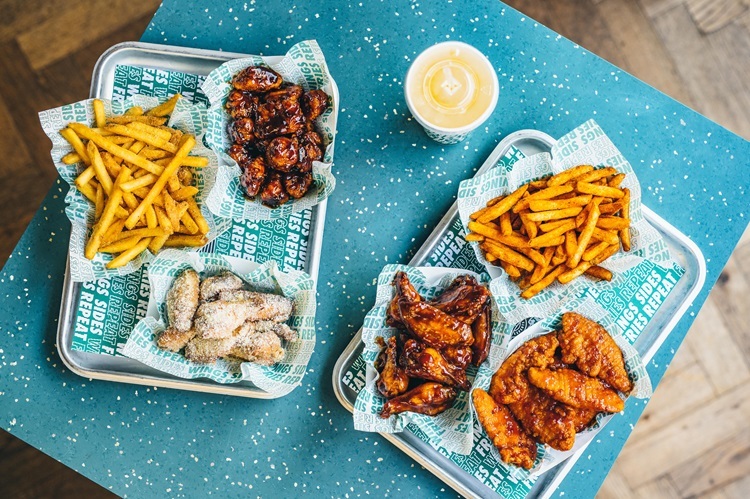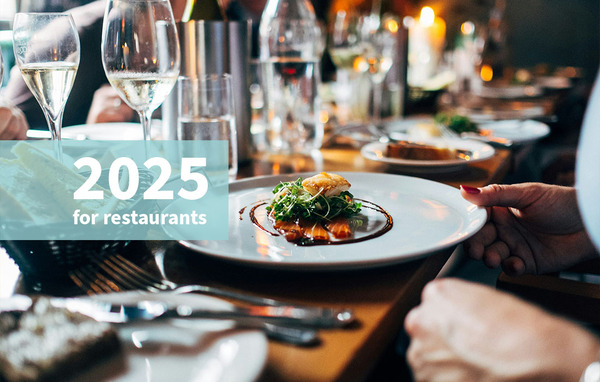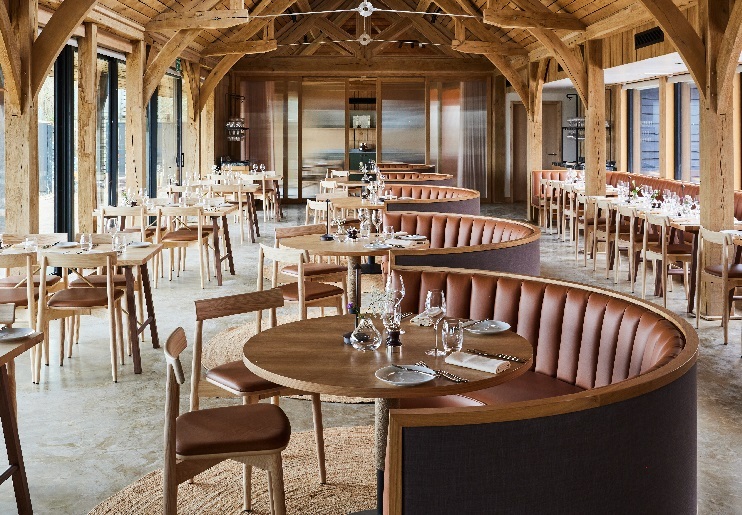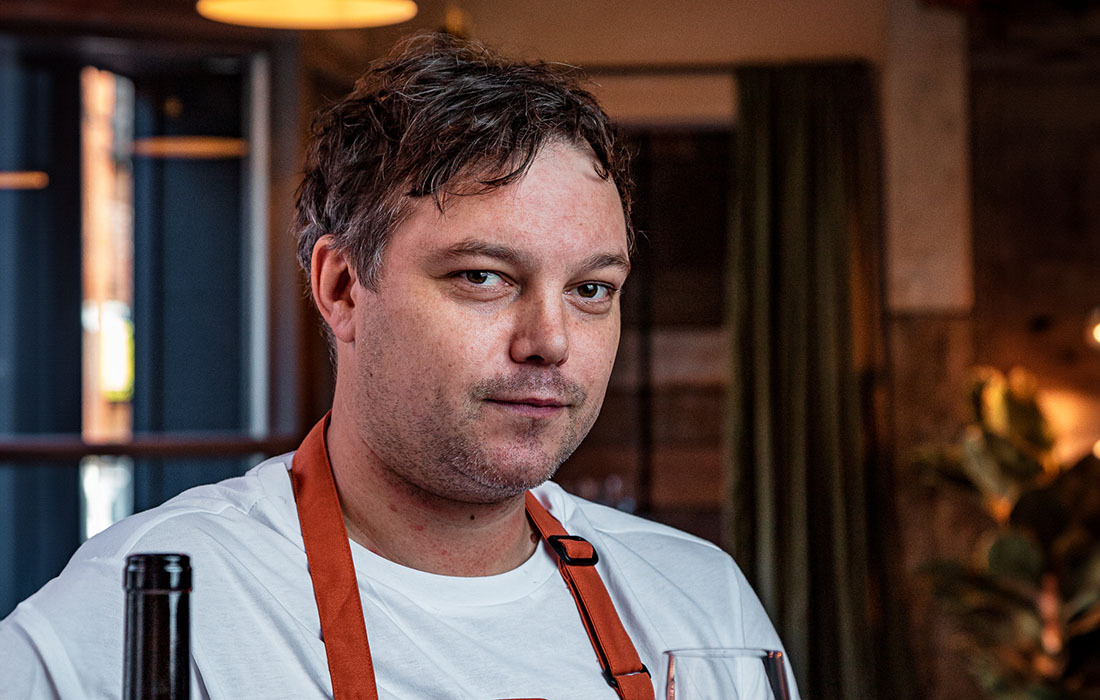Prince of Wales: Gareth Ward, the produce-obsessed chef-patron of Powys restaurant Ynyshir, gives his rules for running a successful kitchen
Gareth Ward has some rules: guests have one menu; if he says a dish is right, it's right; and above all, there's to be no bitching in his kitchen. But the rules are there for a reason: to create food that is a perfect expression of its providence, to have happy chefs and, as he says, to have fun dining, not fine dining. James Stagg meets him
Gareth Ward is an uncompromising character. The same could be said of plenty of chefs, but not many have the confidence to turn an existing business on its head and rebuild it from the ground up.
That's what the chef is steadily doing at Ynyshir, located at the edge of Snowdonia National Park in Eglwys Fach, Powys, in what was once a traditional Relais & Châteaux hotel. Now it's an edgy and experimental 20-cover restaurant with rooms, serving a self-assured, meat-led menu to a hip-hop soundtrack dictated by Ward.
The chef joined the hotel in 2013 under then owners Rob and Joan Reen. In partnership with hotel regulars John and Jenny Talbot, they had bought the business back from Von Essen in 2012 after it went into administration, having originally sold the property to the group in 2006. Back then, it was a classic country house hotel, but Ward says: "Joan was class, she let me do what I wanted and was super-supportive. I got here and thought I'd do three years, find my own style and move on to my own place."
But everything changed when Reen died in February 2016 leaving the business, and Ward, in limbo.
"So I got to the three-year point and, unfortunately, Joan died. It was awful. We didn't know what was going to happen," he says. "I had been thinking of moving on, but it would have looked really bad. Then John Talbot and Jenny said they wanted us to stay; that the business had been built around us."
The Talbots bought Rob Reen's stake and asked Ward and Amelia Eriksson, his partner and the general manager, for their vision for the hotel. They said it would have to be a restaurant with rooms.
The vote of confidence gave Ward the authority to overhaul the business, changing it completely from a leisure hotel where guests would stay for a few days to a destination restaurant where nobody was expected to stay more than a night and the only dinner option was Wardâs 20-course tasting menu.
The pair closed the business for two weeks and, in their own words, âripped it apartâ. The bar was moved to the front of the house to better connect it to the restaurant and allow guests to enjoy views of the manicured gardens and foothills of Snowdonia over pre-dinner drinks. Ward and Eriksson also completely refurbished the restaurant, creating a stripped-back Scandinavian atmosphere with dark grey walls, wooden floors and furniture slung with fur throws. It was a bold move and something of a gamble, particularly for a business in such a remote location.
âSome came to try it and realised they werenât going to get what they wanted any more. It was very much my way or the highway. So itâs been fucking hard work. Though, donât get me wrong, itâs been hard work for six years.â
Now, Ward says that itâs âa dreamâ, and the dark early days where he had to run service alone as he couldnât attract chefs to the remote part of west Wales are over. That is largely because he is doing something quite different and not compromising on this vision. He admits heâs not making any money yet either, but the business plan is taking shape and 2019 is looking like it will be a milestone for Ynyshir with the business set to turn a slight profit.
âThis year looks like itâs going to be incredible,â Ward enthuses. âIn real terms this is our third year of trading and weâre on break even. Even if we get into profit by £1, Iâll celebrate.â
He adds that it was always going to take time for such a radical change to bed in and for his individual approach to be recognised. âThis place isnât normal. Itâs mental, but itâs fucking class. Weâre doing completely different food to anyone else and itâs in our own style. Iâm not watching what any other chefs are doing â" Iâm not interested. I respect what others are doing, of course I do, I just donât want to be influenced by it.â
In fact, itâs hard to pin down Wardâs influences. Heâs undoubtedly taken some inspiration from working as a sous chef at Restaurant Sat Bains in Nottingham, but his menu is very much his own, with a focus on aged meat, pickling and fermenting. The restaurantâs mission statement â" the first thing potential guests read on the website â" is âingredient-led, flavour-driven, far-fuelled, meat-obsessedâ. The description might put some off, but thatâs the intention. There is no vegetarian menu as such, and diners are warned the menu is unsuitable for fish-, alcohol- and soy-free diets.
âSome people come and you think, âwhy are you here?â But I donât hide it,â Ward says. âItâs the first thing you read on the website, intentionally. But you canât please everyone.â
Itâs hard to describe Wardâs cooking any more succinctly than the mission statement, which is also posted around the restaurant. He sources fantastic produce, much of it local, with a strong emphasis on meat, ageing it, marinating it and typically barbecuing it before presenting it in a series of bite-sized courses.
There are no sauces or stocks in the kitchen; instead, Ward employs Japanese and Chinese flavours to season his food, though he is dismissive when asked if this was always his plan.
âIâm not going to lie, I make it up,â he admits. âPut a bit of soy sauce in and everyone thinks itâs Japanese. As long as itâs got mirin, miso, soy, dashi and maybe some rice vinegar youâre laughing. Itâs food that I love to eat, so I love to cook it.
âIt started off with just one dish with those ingredients, but the way I think of a menu is that it has to all work together, so I thought I had to keep that flow. So I got rid of salt and seasoned every dish with soy, miso, rice vinegar and mirin. We donât use any salt except for curing, though Iâm looking into curing with soy.â
âIâd never had aged fish before, so I thought Iâd try it out and itâs mind-blowing,â he says. âIâve a £20,000 salt chamber, so I thought, letâs put everything in it. We put salmon belly in there too.â
Taking pride of place in the salt chamber is the Welsh wagyu, a meat that Ward has put on the map. Sourced from a farm just a few miles from Ynyshir, it forms the heart of the menu, appearing as a burger, a rib and as a tartare. The fat is served with sourdough, in a miso treacle tart, and as Welsh wagyu fudge. Itâs quite some product, particularly after Ward has pushed the ageing (the length of time the meat has been aged is displayed on a digital timer near the kitchen, and it stood at 193 days when The Caterer visited). Itâs a risky process, and certainly not great for cashflow, but Ward wonât compromise.
âObviously, you shit yourself a little bit by leaving it so long,â he says. âI was originally buying aged meat, but itâs much more fun to do it yourself â" the satisfaction is amazing. And having the fridge out there, where weâre constantly monitoring, changing and pushing, I get a huge amount of pleasure.â
âIâm cooking. This is my restaurant. I see every dish that goes out of the room,â Ward says. âThe buck stops with me. I taste everything that goes out to make sure itâs right, so if the customer says itâs wrong, theyâre wrong.â
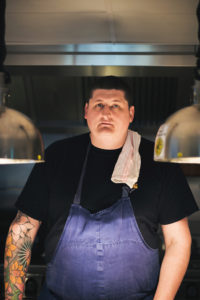
This confidence and dedication, along with the great scope for innovation and experimentation, has attracted other chefs to the business. In the early days Ward found it hard to recruit, but not now.
âThere were days when it was just me in the kitchen because I couldnât get any staff,â he explains. âWeâre in the arse-end of nowhere and we didnât have a reputation. Now itâs different and I have a waiting list of chefs.â
He puts it down to the opportunity to work in an environment squarely aimed at inspiring the chefs to deliver exceptional dishes. They choose the records played each night (they are also listed on the menu) and are given licence to experiment, all in a calm atmosphere.
âThereâs zero stress here; I wonât allow it,â Ward says. âThereâs no shouting and screaming, thereâs no bullshit. If someone starts bitching or moaning, Iâll stop it straight away.â
This is partly because the chefs are surrounded by their guests, so canât help but be fully immersed in the experience. The approach has paid dividends, with the Michelin-starred restaurant winning a number of accolades, including being named Best Place to Eat in Wales 2018 by Wales Online and taking the number five slot in The Good Food Guide 2019 with Ward recognised at its Chef of the Year.
âIâm not into fine dining â" for me, itâs done,â Ward says. âI call what I do fun dine, not fine dine, because itâs all about having a laugh. We all work hard, and nobody has any money anymore, so if someone comes here and spends their money, they want to have a good time. They should be able to wear what they want to and relax and have a laugh. I donât want them to feel like theyâre in a stuffy restaurant with someone waiting over them to pour water.â
The only disappointment for Ward is that some of the guests choose to stay elsewhere in the nearby village, rather than take advantage of the Ynyshir rooms, which are being individually refurbished to bring them closer in design terms to the appearance of the restaurant. The former bar on the ground floor is the first to have been refurbished, with the rooms upstairs in the main house to follow. However, he and Eriksson are about to embark on a project to widen the appeal of the business and potentially head off any threat from Airbnb.
âWeâre looking at doing some glamping,â Ward says. âWe have a teepee already but weâre looking at more. The garden costs us £12,000 a year in upkeep, so we have to make it work. The restaurant canât sustain that, but if we get some teepees and do some glamping it might cover the cost of the garden. And itâs very cool.â
Itâs not the only scheme Ward is planning to diversify the business and add revenue streams. He is also eyeing up the outhouses, which currently provide storage, to create businesses that service both his guests and the local community.
âThis is my life, itâs not a hobby,â Ward says. âItâs a business and these nine rooms and 20-cover restaurant will never make enough money. We need other revenue streams coming in to make some decent cash.
âWeâre thinking about doing a pub in the outbuildings. Maybe a bakery and a shop. You have to do everything you can without compromising on quality.â
Ward refuses to compromise anywhere, and that is what makes Ynyshir such an attractive dining destination. Nothing is spared in the pursuit of flavour. It might have meant that itâs taken time for the business to be viable, but thanks to some passionate and patient owners, the chef has been given the time to find his feet in business and develop a product that is a true reflection of his slow-food style.
âYou look at the gross profit and think, this is shit,â Ward says. âBut I donât look at it for that reason, otherwise Iâd be swayed by it. I work to get a dish right and serve the best food I possibly can. And I enjoy doing it.â

⢠Not French onion soup
â¢Â Aylesbury duck from Fishguard
â¢Â Goosnargh chicken katsu
â¢Â Bread miso cultured butter, Welsh wagyu dripping
â¢Â Aged mackerel wasabi
â¢Â Cod black
â¢Â Hoisin cucumber
â¢Â Cawl spring
â¢Â Pork belly char sui
â¢Â Duck liver Cox apple, spelt, eel
â¢Â Garlic prawn
â¢Â Chilli crab
â¢Â Welsh wagyu 05/09/18 burger, raw, rib
â¢Â Beauvale Comice pear (optional)
â¢Â Yuzu slushy
â¢Â White chocolate black bean
â¢Â Parsnip rye, maple, verjus
â¢Â Miso treacle tart
â¢Â Rhubarb and custard
â¢Â Tiramisù
â¢Â Welsh wagyu fudge
Twenty-course lunch or dinner, £150
On the playlist ACDC Back in Black
Anderson .Paak Malibu
2Pac All Eyez on Me
Mobb Deep The Infamous
Fugees The Score
Creedence Clearwater Revival Green River
Age and experience
Ward likes to take his time over food. He admits that no dish is ever truly finished, with everything a work in progress and perfection the only goal. Itâs all part of his respect for the ingredients that he has worked so hard to source. There is no wastage in the kitchen, as any produce that canât be immediately employed is pickled and fermented to see the restaurant through lean spells.
âSome of the dishes might look the same as they were four years ago,â Ward says. âBut when you eat them youâll realise, âyou know what, thatâs better, thatâs changedâ. Weâre constantly searching for the best.â
A project Ward says is the biggest heâs ever undertaken is his sourdough. The bread, which is made using flour from grains milled on-site, has an incredible depth of flavour thanks to the slow-prove technique he has employed.
âThe starter is over six years old,â he says. âThe seven-day prove takes that over-sour flavour away, as itâs done so gently without any heat. Once itâs ready, we have to burn the crust when we bake it, because after seven days the outside is completely dry. It makes it chewy. For me, itâs the best slice of toast Iâve ever had.â
The bread, made with buttermilk rather than water, is accompanied by a homemade cultured butter as well as a quenelle of wagyu dripping.
Like the bread, the simple appearance of the other dishes often belies the time that has gone into their development. But the intensity of flavour achieved is justification for the effort. One such surprise is a dish of char sui pork belly, served as two slices in its own cooking juices. Itâs an intense mouthful that carries incredible flavour.
âThat dish took two years to master,â Ward explains. âWe use a Middle White-cross from Derbyshire â" theyâre bred for bacon, so theyâre fatty animals â" and I mess around with the marinade all the time.â
The pork is brined for five days in a 5% salt solution before resting in a char sui marinade for 48 hours that contains hoi sin, fermented tofu, loads of garlic, ginger and sugar. Itâs then removed and put in oil.
Ward says: âItâs the same with salmon. The process means it can be stripped of moisture. But if you put it back in oil for the same amount of days it comes out fresh again. Char sui is quite harsh, so to get it back into the oil brings it back to life. Then we gently cook it and char it on the barbecue.
âIâve gone through so much pork to get that recipe right itâs unbelievable. I nearly gave up a few times. It has to blow your mind â" but itâs just a piece of meat sitting in a bowl.â
Passage to India: Atul Kochhar on his new restaurant Kanishka >>
Gareth Ward takes stake in Ynyshir Restaurant and Rooms >>
Get The Caterer every week on your smartphone, tablet, or even in good old-fashioned hard copy (or all three!).



